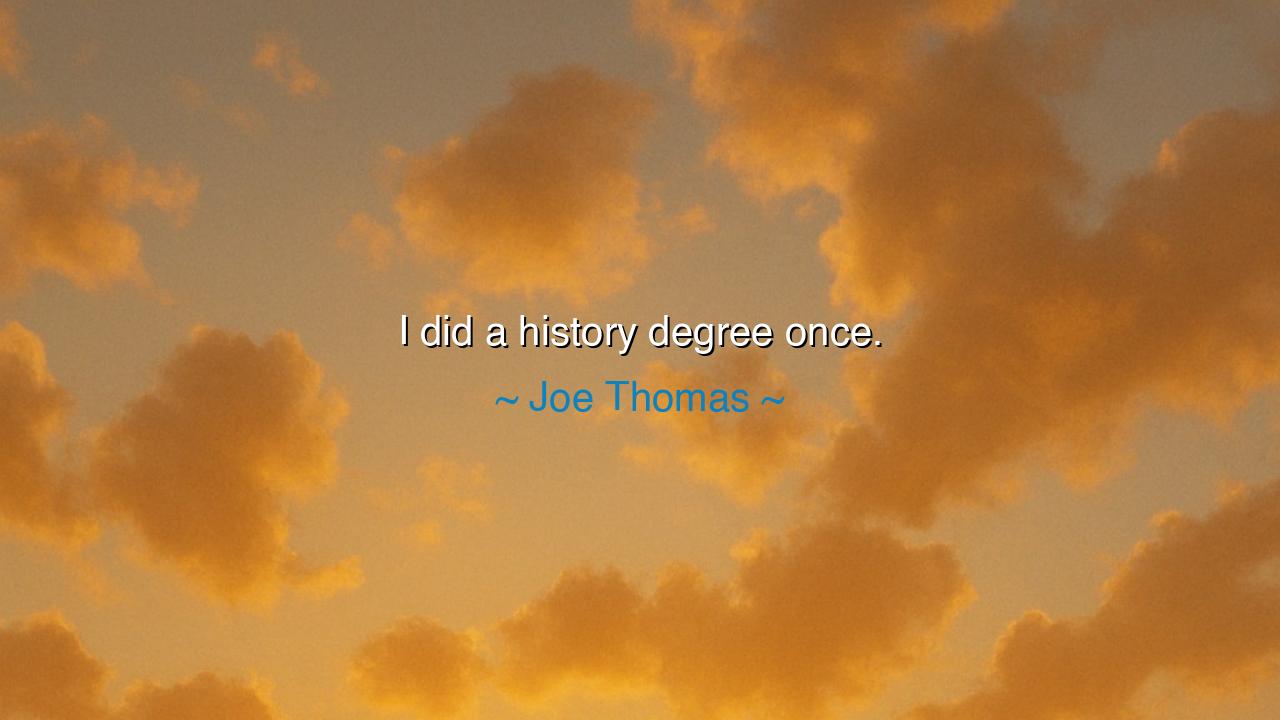
I did a history degree once.






“I did a history degree once.” — Joe Thomas
At first hearing, these words may seem light, almost tossed into the wind as a passing jest. Yet beneath their simplicity lies a truth as enduring as time itself. When Joe Thomas said, “I did a history degree once,” he was not merely recalling a scholarly pursuit, but revealing something far more profound — the way our past, once studied, never truly leaves us. For history, once entered into the mind, becomes a mirror of all that we are and all that we might yet be. It lingers, like the echo of a long-forgotten hymn, whispering through every decision, every doubt, every dream.
To study history is to converse with ghosts — not to mourn them, but to learn their language. It is to walk with the conqueror and the conquered, to feel the pulse of nations long turned to dust, and to see that every moment we live is the child of countless yesterdays. Thus, when one says, “I did a history degree once,” it is not a confession of the past, but an acknowledgment of inheritance — of having once gazed into the vault of human experience and returned changed. It is the soft pride of one who has listened to the long tale of humanity, and now carries that quiet wisdom into the noise of modern life.
Consider the story of Edward Gibbon, the great chronicler of The Decline and Fall of the Roman Empire. His journey began, as all such journeys do, in curiosity. He did not know that by studying the rise and ruin of Rome, he would find reflections of his own age, his own nation, and his own self. Yet in uncovering history, he uncovered truth — that every empire, no matter how grand, is mortal; that power fades, but knowledge endures. In this way, even a simple degree becomes a form of initiation — a rite through which one learns that time itself is the greatest teacher.
There is irony in Joe Thomas’s words, and perhaps a smile hidden within them. For he is known not as a historian, but as an actor and comedian, a weaver of laughter rather than chronicles. Yet that is what gives his statement its deeper resonance. To have “done a history degree once” is to have seen beneath the mask of the present — to know that every jest, every role, every act of creation is part of a much larger play. It is to understand that even comedy has its roots in tragedy, and that the world’s laughter often grows from the soil of its sorrow.
The ancients would have understood this well. The Greeks taught that Clio, the Muse of History, was sister to Thalia, the Muse of Comedy. Together they remind us that all art, whether grave or joyous, springs from the same human story. So when Joe Thomas speaks with lightness, there is also wisdom in his tone — the wisdom of one who knows that history is not merely a record of kings and wars, but a living thread that binds all human experience, from the scholar’s parchment to the stage.
And so the lesson is this: never dismiss the education that has shaped your sight. Even if the books have long been closed, their pages still whisper in your thoughts. Whatever you once studied — whether it was history, music, or the quiet language of the stars — let it inform your way of being in the world. For the knowledge you once pursued is not lost; it has become part of your design, as salt becomes part of the sea.
In the end, “I did a history degree once” is not a throwaway remark, but a quiet poem about memory, learning, and the unseen threads that connect past and present. It teaches us that no education, no experience, no chapter of life is ever wasted. Each remains within us, altering our perception, deepening our understanding. So when you look back upon your own past and are tempted to say, “That was long ago,” remember this: nothing truly ends. The past lives within you, and through you, it continues to write the next chapter of human history.






AAdministratorAdministrator
Welcome, honored guests. Please leave a comment, we will respond soon